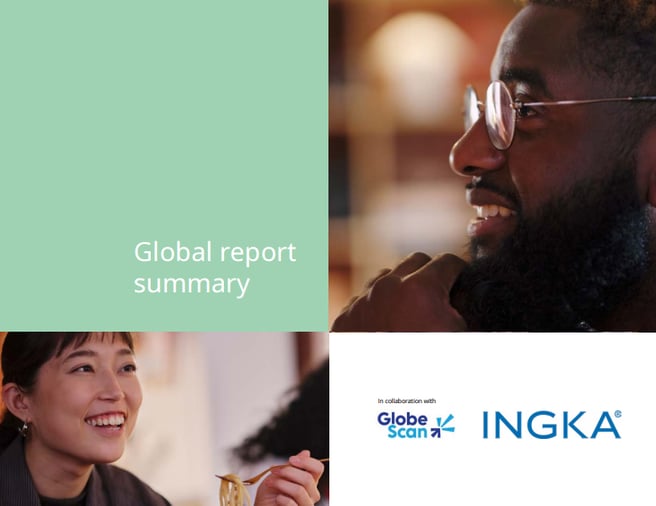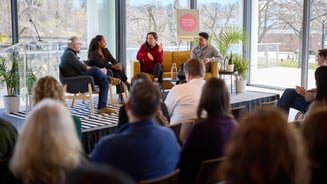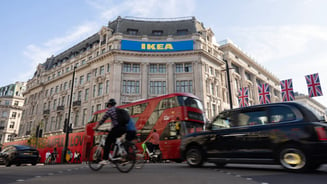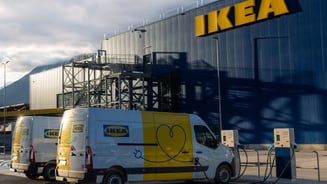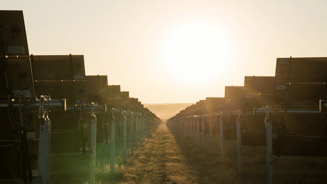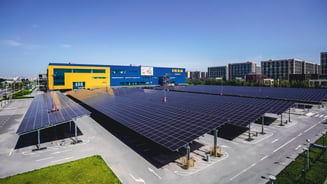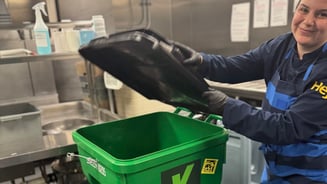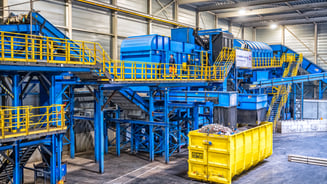Despite widespread concern and a strong desire to act, a new study reveals that many people are being held back by significant systemic barriers in taking meaningful climate action.
Research from Ingka Group, the largest IKEA retailer, and independent insights consultancy GlobeScan, finds that while most people want to live more sustainably, many feel unable to do so because of three main challenges: lack of support from government and business, uncertainty about which actions have the most impact, and cost.
Based on responses from more than 30,000 people across 30 countries, the People and Planet Consumer Insights and Trends 2025 study highlights a striking gap between intention and action: 81% of people say they are willing to do more to tackle climate change, but only 40% report taking substantial action today.
This gap – between what people want to do and what they feel able to do – underscores how systemic, informational, and affordability barriers are preventing progress on sustainable living.

Karen Pflug, Chief Sustainability Officer, Ingka Group
“The world can only be sustainable if everyone can afford to live more sustainably. This research shows that affordability is a barrier in itself – many people feel excluded from acting because of cost. We believe sustainable living should not be a privilege, which is why we work to make it both accessible and affordable for the many – for example, through solutions that help reduce food waste and support waste sorting in the home, more affordable plant-based food, and circular services such as Buy Back & Resell or our As-Is areas, where second-hand and ex-showroom items are sold at lower prices. Sustainable living also needs to be easy and desirable – so that choosing the better option becomes a natural, everyday choice.”
Key Findings
- Lack of systemic support is the top barrier: 46% say insufficient support from government and 39% say not enough support from business prevents them from taking more climate action.¹
- Uncertainty about impact: 44% say not knowing which actions have the most impact stops them from doing more.²
- Affordability remains a major barrier: 41% say cost prevents them from taking further action.³
- Willingness remains strong: 81% say they are willing to do more to reduce climate change.⁴
- Concern is highest among young adults and families: Concern peaks among 18–24s (67%) and those living with children (68%).⁵
Beyond Intent: Understanding Behaviour
The research highlights the intention–action gap: people care and are willing to do more, but affordability, lack of clarity, and insufficient systemic support make it difficult to turn intention into impact. For behaviour change experts, the challenge is not just knowing what people say they want, but understanding why they act the way they do, and how barriers can be broken down to unlock more sustainable choices and habits.
“This research gives us a window into how people are thinking and acting today – and that’s an important starting point. But real change requires us to go deeper: to understand not just what people do, but why and how we can support them in the process. Climate anxiety, for instance, can feel overwhelming, yet with the right support it can be transformed into a powerful driver of action. And while simple actions like recycling are important, the real challenge and opportunity lie in scaling them up to bigger lifestyle shifts – including circular behaviours such as care and repair, or even more sustainable transport use beyond the home. That’s where businesses and governments must step up – to remove barriers, create enablers, and make sustainable living the new normal,” adds Dr Patrick Elf, Associate Professor in Sustainable Business, Middlesex University.
A Global Research Perspective
GlobeScan’s findings show that these challenges are consistent across countries and cultures, pointing to a shared structural problem.
People around the world feel overwhelmed by the scale of today’s environmental and social challenges. Constant exposure to negative news has led many to disengage, not out of indifference, but as a way to cope. People feel discouraged by the lack of visible progress from governments and business – especially among younger generations. They doubt the impact that they can have as individuals to address climate change and they feel alone in their efforts.
People remain strongly motivated to take more action to help reduce climate change, driven by practical benefits like saving money (#1 motivator) and improving health (#3 motivator). Knowing the impact of their efforts is the second most powerful motivator, yet many are unsure which actions matter most and aren’t prioritizing those with the biggest impacts. Cost and limited systemic support still pose challenges, but the desire to do more is clear – and people want guidance and solutions that make sustainable choices affordable, impactful, and easy.
“The challenges we’ve uncovered cut across geographies, generations and cultures – they’re universal and structural. For business and government leaders, that’s a clear call to focus on enabling change at scale, rather than expecting individuals to carry the burden alone. Our study shows that people across the world need access to sustainable products and services that help them in their daily lives. They also need direction on what actions have most impact and to see leadership by example from governments and business,” says Caroline Holme, Executive Director, GlobeScan.

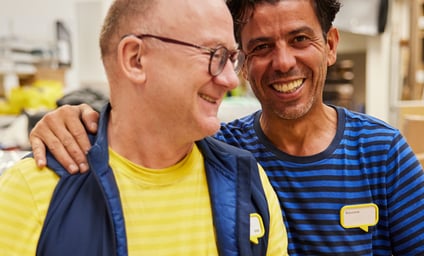
A Call for Collaboration
The purpose of the biennial People & Planet study is to better understand how people think, feel, and act on climate and inequality – and to use those insights to open honest conversations about the barriers they face.
Later this month, Ingka Group will host a roundtable with internal and external experts — including Dr Patrick Elf, Associate Professor in Sustainable Business at Middlesex University; Caroline Holme, Executive Director at GlobeScan; and Connor Hill, Head of Circular and Sustainable Living at Ingka Group – to explore what the results mean in practice. Highlights from that discussion will be shared on the Ingka newsroom following the event.
“People are ready to act, but they cannot do it alone. It’s time for governments, businesses, and communities to step up together – because only through radical collaboration can we close the intention–action gap. This isn’t about small fixes or working in silos; it’s about combining our strengths to remove all types of barriers – not just cost – and make sustainable living affordable, easy, and desirable for the many,” concludes Karen Pflug.
About the Study
The People and Planet Consumer Insights and Trends 2025 report is the latest in a biennial series by Ingka Group and GlobeScan. It surveyed more than 30,000 people across 30 countries to understand perceptions, barriers, and behaviours around climate action, social equality, and sustainable living.*
The study is part of Ingka Group’s wider approach to listening and learning, which also includes the Life at Home Report, a qualitative study of how people live, feel, and act in their everyday lives. Together, these insights provide a more complete picture of the barriers people face and how to close the intention–action gap.
Notes to Editors
- Top barrier — lack of support from government: Barrier question: “Which of the following, if any, prevents you from doing more to help reduce climate change?” Base: All respondents (n=30,701, 30 countries, 2025). 46% selected “not enough support from government” (#1 barrier), 39% selected “not enough support from business” (#4 barrier).
- Second barrier — uncertainty about impact: Same barrier question as above (Base: n=30,701, 30 countries, 2025). 44% selected “I don’t know what will have most impact.”
- Third barrier — cost/price: Same barrier question as above (Base: n=30,701, 30 countries, 2025). 41% selected “Too expensive.”
- Willingness to do more: Attitudinal question: “Would you be willing to make any future changes to your behaviour to help reduce climate change?” Base: All respondents ( n=30,701, 30 countries, 2025). 81% responded “ “make an effort”/”make a strong effort”.
- Concern levels: Attitudinal question: “How much do you worry about climate change?” Base: All respondents (n=30,701, 30 countries, 2025). Concern is highest among 18–24-year-olds (67%) and those living with children (68%). Compared with 2023, aggregate concern and empowerment scores show a downward shift.
*This survey was conducted in partnership between Ingka Group and GlobeScan, an independent insights and advisory firm, in March and April 2025. This research was conducted online using reputable national consumer research panels to recruit respondents in 30 countries. The total sample size across the 30 countries was 30,701 adults (aged 18+). The 30 countries surveyed are: Australia, Austria, Belgium, Canada, China, Croatia, Czech Republic, Denmark, Finland, France, Germany, Hungary, India, Ireland, Italy, Japan, the Netherlands, Norway, Poland, Portugal, Romania, Serbia, Slovakia, Slovenia, South Korea, Spain, Sweden, Switzerland, the UK, and the USA.
About Ingka Group
With IKEA retail operations in 31 markets, Ingka Group is the largest IKEA retailer and represents about 90% of IKEA retail sales. It is a strategic partner to develop and innovate the IKEA business and help define common IKEA strategies. Ingka Group owns and operates IKEA sales channels under franchise agreements with Inter IKEA Systems B.V. It has three business areas: IKEA Retail, Ingka Investments and Ingka Centres. Read more on Ingka.com.
Media enquiries
For further information, journalists and media professionals can contact us at [email protected] or by calling +46 70 993 6376.
